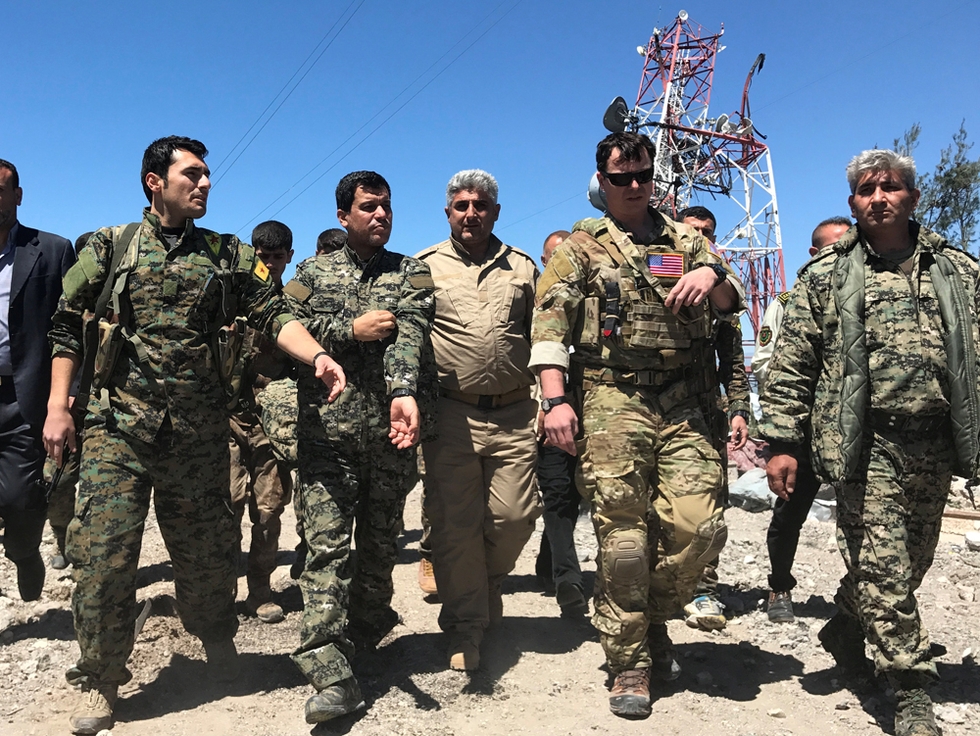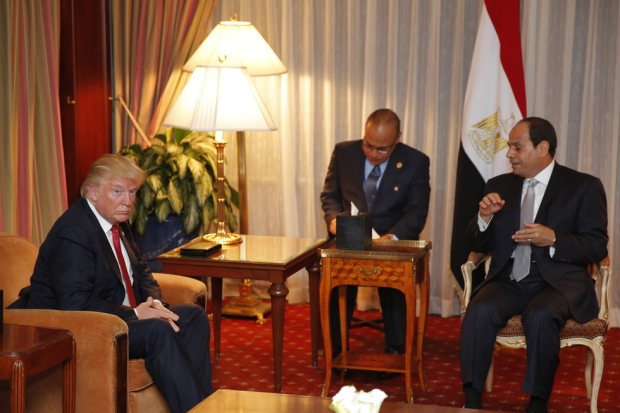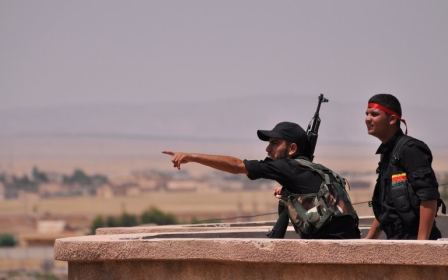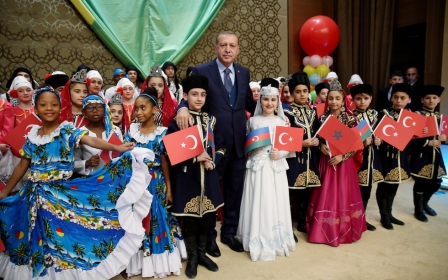ANALYSIS: The YPG, a grenade in the room at Trump-Erdogan talks

ISTANBUL, Turkey - The announcement came just days before the presidents of the US and Turkey were to meet for the first time - American heavy weapons would be given to Turkey's mortal enemies in Syria to defeat Islamic State. It was a shot in the arm for the YPG, but for Ankara, the timing of the announcement could barely have been worse.
Tuesday's decision by Donald Trump, the US president, has sent shockwaves through Ankara, which considers the YPG an extension in Syria of the Kurdish militia PKK, which has fought a decades-long war with Turkey on its own territory. Nurettin Canikli, a deputy prime minister, said he simply could not accept the decision while the Turkish foreign minister, Mevlut Cavusoglu, said that every weapon obtained by the YPG constituted a threat to Turkey.
Turkey has two options. One: accept the US position. Two: accept the US position
- Huseyin Bagci, professor
Analysts say the latest snub will add further pressure to the first face-to-face meeting on Monday between Trump and his Turkish counterpart, Recep Tayyip Erdogan, at the White House.
Huseyin Bagci, a professor of international relations at Ankara's Middle East Technical University, told Middle East Eye that Tuesday's developments have all but ensured a confrontational meeting.
"Donald Trump is not going to change his mind. Turkey has two options. One: accept the US position. Two: accept the US position," said Bagci. "Turkey cannot pressure the US into abandoning the YPG. The US priority is to fight IS. The US at the moment is not interested in Turkey's concerns that these weapons will eventually get to the PKK."
Growing US support for the YPG is a major faultline tearing through the traditionally strong US-Turkish relationship. Turkey has offered to work directly with the US and the US-led anti-IS coalition to remove IS from Raqqa in Syria, but only if the US stops working with the Syrian Democratic Forces (SDF), which is mainly comprised of YPG fighters.
The US has ignored Turkey's stance, enraging Turkey to the point where Erdogan's adviser, Ilnur Cevik, on 2 May warned that US soldiers working with the YPG could become collateral damage in Turkish attacks.
"If they carry on like this our guys won’t think American armoured vehicles are there… all of a sudden you will see that a few rockets have struck them as well," Cevik said.
On Wednesday, the Turkish defence minister, Fikri Isik, said: "Turkey does not have the power to single-handedly change the game but it does have the power to protect its interests."
Erdogan believes continued US support for the YPG is a remnant of Obama-era polices and that Trump might not necessarily be aware of the details.
The Turkish president said he plans to present Trump with photographic evidence of US cooperation with the YPG to make clear Ankara's discomfort - suggesting Turkey believes Trump is not fully informed about what the US is doing in Syria.
Kilic Bugra Kanat, research director at the pro-government SETA Foundation think-tank's Washington office, said the issue of the YPG was of "critical importance".
"It includes an element of territorial integrity," he said. "Turkey may not be willing to bargain."
In Bagci's view, the US will not be swayed since it has already decided to create a Kurdish state in parts of Syria and Iraq, and the fact Trump has decided to travel to Israel and Saudi Arabia - and not Turkey - on his first international visits has not gone unnoticed in Ankara.
"The choice of Saudi Arabia and Israel for Trump's first foreign visit needs to be seen in this context. He will be looking for those two countries to provide financial and regional political backing for any such Kurdish state," said Bagci.
He said this idea goes as far back as Woodrow Wilson's 14-point programme in 1918, and that America wants to be seen as keeping its promises.
Deal or no deal
While the arming of the YPG is expected to dominate Monday's meeting, it is not the only faultine in the US-Turkish relationship. The second is the continued freedom of self-exiled US-based Turkish preacher Fethullah Gulen.
Ankara accuses Gulen and his movement of orchestrating last July's failed coup bid. It wants the US to extradite Gulen based on an existing treaty between the two countries.
The US justice department has said it will act based on evidence provided. The Turkish government says it has provided plenty of evidence. Turkey's justice minister, Bekir Bozdag, flew to the US on 7 May to meet his counterpart and discuss the extradition.
In this case too, Ankara expected to see a different approach after Trump took office. The belief in Turkey was that the Gulen movement had backed the wrong horse in Hillary Clinton and would suffer as a result.
Here, too, the US position hasn't changed since Trump took office. Turkey has even softened its demand, requesting that Gulen at least be placed in detention until a final decision is reached.
"The desire to see Gulen extradited is also critically important. The events on the night of the attempted coup on 15 July is clear for all to see," said Kanat. "Turkey's security council has listed Gulen as a national security threat. Turkey, again, may not be willing to bargain."
New leader, old problems
Both these issues arose during former president Barack Obama's second and final term in office. With the Obama administration deaf to Ankara's pleas, it in return opted to ignore the White House as much as possible and pinned all its hopes on Trump.
The Turkish leadership went out of its way to praise Trump and even its reaction to many of his actions which were construed as Islamophobic, such as the Muslim travel ban, was mild at best.
But Erdogan has never appeared to be a priority for Trump. Erdogan wasn't among the first leaders that Trump called. He has already met with various regional heads, including Egypt's Abdel Fattah al-Sisi and Jordan's King Abdullah.
And unlike Obama, Trump hasn't included Turkey on the list of his first major foreign trip.
"Trump and Erdogan will get along very well once they meet because both are autocrats within democratic structures. But that will not translate into cooperation between the two countries at this time because their worldviews are entirely different," Bagci said.
This difference in worldview is typified by how the two leaders approach Egypt, said Bagci.
For Trump, Sisi is the go-to man to tackle what Trump sees as Islamic or Islamist radical terrorism
- Huseyin Bagci, professor
"For Trump, Sisi is the go-to man to tackle what Trump sees as Islamic or Islamist radical terrorism. To him all these Islamist groups represent radical terrorists. Erdogan, on the other hand, reviles Sisi for toppling the Muslim Brotherhood whom he supports."
Kanat told MEE that it would be wrong to ask whether Turkey had made the right choice by backing Trump before the first face-to-face meeting had even occurred.
"The important preliminary meetings will take place this week and will culminate in the meeting between the presidents. We will then have an indication of how relations will progress."
Kanat said what was clear was that the Obama administration's flawed foreign policy left not just Turkey but all its allies in the Middle East and elsewhere unhappy.
He also said any attempt to judge Trump's positions on Turkey based on his first 100 days would be inaccurate.
"Trying to read into Trump's position on Turkey after his first 100 days in office is wrong. It takes time for a new administration to fill up various positions and roles. Trump has had to deal with a host of internal matters. It isn't easy taking over the mantle after someone else has been in charge for eight years," said Kanat.
Common ground
There are, however, incentives for the Trump administration to address these concerns and keep its Turkish ally happy.
All indications are that Trump wants to confront and restrict Iran. He would find it very difficult to do so without Turkish help. He will also need Turkey's unwavering support if Russia continues to flex its muscles and threaten US interests in the region.
Turkey, too, will see the US as an ideal friend especially after Secretary of State Rex Tillerson made clear last week that the Trump administration believes it should not base its foreign policy on values such as human rights and free speech.
This approach means Ankara will be happier to work with Washington instead of the EU, with which it has strained ties over criticism at the direction Turkey is headed towards in terms of democracy and human rights.
The next four years in the Turkey-US relationship will likely be determined by what sort of personal chemistry there is between Erdogan and Trump.
Bagci believes that although they will personally get along very well, the relationship will be difficult because Turkey is a country of secondary importance for Trump.
"Personal chemistry between the leaders of the US and Turkey has always played a big role in whether relations progress smoothly or not. If the two presidents strike up a good relationship, ties will proceed well," said Kanat.
New MEE newsletter: Jerusalem Dispatch
Sign up to get the latest insights and analysis on Israel-Palestine, alongside Turkey Unpacked and other MEE newsletters
Middle East Eye delivers independent and unrivalled coverage and analysis of the Middle East, North Africa and beyond. To learn more about republishing this content and the associated fees, please fill out this form. More about MEE can be found here.






